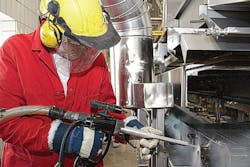In recent years, food safety has become a growing concern among consumers. A recent International Food Information Council Foundation’s Food & Health Survey found that 61 percent of Americans are at least somewhat confident in the safety of the food supply, down from 66 percent in 2016. With lagging consumer confidence, food manufacturers are focused now more than ever on new and innovative ways to mitigate risk and ramp up food safety measures in their processing plants. It’s no surprise that food safety made RSM’s list of top 2018 trends for food and beverage industry businesses.
Changing customer preferences also makes the 2018 trends list with a focus on healthy eating options. In fact, according to a 2014 shopping behavior survey by Statista, 36.2 percent of consumers almost always look for health claims when deciding to purchase a product, prioritizing manufacturing processes more than ever before. With this trend in mind, RSM says many companies in 2018 will add new product lines or introduce healthier products and ingredients to their existing foods and drinks.
As consumers increasingly demand additive-free foods that still look, taste, feel and last like their nonorganic counterparts containing preservatives, food manufacturers have turned to high-pressure processing (HPP), which eliminates bacteria while maintaining product longevity and flavor consistency. Through this method, outlined in our February cover series article, brands are able to deliver the quality their customers expect in a manner that can be presented as both natural and environmentally friendly.
Observing this current “clean label” trend, PMMI (The Association for Packaging and Processing Technologies) created the Cold Pressure Council in March 2017 to promote industry standards and help consumers understand the HPP method. Launching in the spring of 2018, the council offers members a Cold Pressure Verified logo to affix to products properly manufactured with HPP. Council members are only permitted to use this logo after receiving third-party verification of their process, hazard analysis, critical control points plan and validation studies.
The council is focusing on North America now, but it plans to become a global organization, bringing HPP standards and education to the global food and beverage industry. North America holds almost 60 percent of the global HPP market, with Europe coming in at 25 percent and Asia at 10 percent.
“It’s an exciting time for HPP,” said Jeff Williams, chairman of the council and CEO of Avure, a company that makes HPP machines. “HPP is a $12-billion-a-year retail industry and with consumers’ demand for clean label foods, we see the sector growing by leaps and bounds.”
From clean labels to clean processing plants, some food processors, including a Texas bakery, are turning to dry ice blasting to improve their equipment cleaning processes. Learn more about this method and its potential for saving costs, improving productivity and extending equipment life in Cold Jets’ article article on dry ice cleaning for food processing facilities.
Our food and beverage cover series ends with a story of two business partners, owners of Solace Brewing Company, who installed a pre-insulated plastic piping system to convey cold glycol that maintains proper fermentation and cellaring temperatures depending on beer style. Learn more about their brewery piping system design from GF Piping Systems here.
Cheers!

